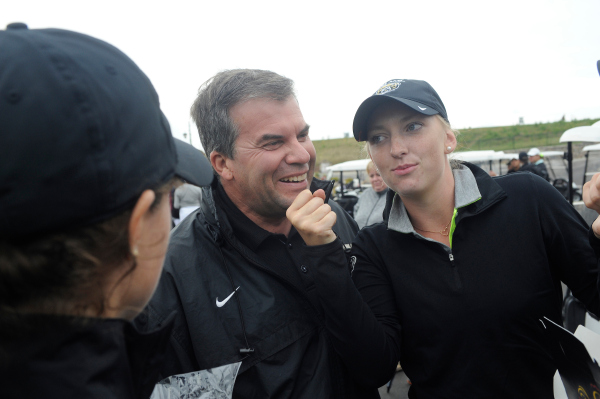
Article reposted from Oakland Press
Author: Oakland Press
Oakland University Associate Athletic Trainer Tom Ford announced on Saturday that he is stepping away from his duties due to being diagnosed with Amyotrophic Lateral Sclerosis (ALS), commonly known as Lou Gehrig’s Disease.
Ford has spent 30 years at Oakland providing outstanding treatment to thousands of student-athletes during his tenure.
“This illness came to me and my family as a complete surprise,” said Ford in a press release. “The athletics department identifies each area with the person’s fathead and favorite movie quote. My quote is from the movie Forrest Gump and it is ‘My Mama always said, life is like a box of chocolates. You never know what you’re gonna get.’ How ironic is my movie quote now.
“I’m currently on ALS information overload. I’m trying to learn like everyone else about this disease. I knew about Lou Gehrig and the Ice Bucket Challenge which the Athletic Training staff took part in a few years ago. But other than that, I’m learning. Unfortunately this disease cannot be treated with ice, rehabilitation and tape.”
Ford came to Oakland in 1988 and immediately began working with the men’s and women’s basketball teams, along with the day-to-day duties of the athletic training office as the university’s only athletic trainer. In June 2012, Ford was recognized as the Michigan Athletic Trainer’s Society’s (MATS) Distinguished Athletic Trainer Award honoree for his superlative service to the field. He has worked with men’s basketball ever since his arrival, finishing his 30th season on the bench for the Golden Grizzlies. This year he also primarily worked with women’s soccer, as well as the men’s and women’s golf teams.
“Tom has been with me for 30 years, he is part of the fabric of not only the basketball program, but the athletic department,” said men’s basketball head coach Greg Kampe. “Wherever I go, athletic alums are always asking how T Ford is doing. He is a legend among the student-athletes, and is someone who they believed in, confided in and used as one of their biggest mentors as they progressed through their athletic careers.
“Tom spent his life keeping our athletes healthy, and now it’s on us to help him as he goes through this health issue. As a coach, colleague and friend, I am indebted to him for his service and will always be there for him. He will always be a part of our program.”
A Rochester Hills resident, Ford was recently inducted into the Ball State University Cardinal Sports Medicine Society Ring of Honor in 2016. He worked at the United States Olympic Sports Festival and Olympic Training Center with men’s hockey, and with the speedskaters at the Winter World University Games in Bulgaria.
Ford received a bachelor’s degree from Ball State in 1981 and went on to earn a master’s degree in health/athletic training and sports medicine from the University of Arizona in 1982. After he graduated from Arizona, he worked as an assistant athletic trainer for the Dallas Cowboys (1982) and spent six years as head athletic trainer at Cypress Creek High School in Houston, Texas before coming to Oakland University.
“Lou Gehrig once said in a speech that he considered himself the luckiest man on the face of the earth,” said Ford. “Well I’m here to tell you that I feel equally lucky. I could never have done this without the support of my family and for that I’m very grateful. The university, the athletics department and the tremendous student-athletes that I have had the pleasure working with have made it fun to come to work every day. That will be the thing I miss the most, the relationships that have been built over time.”
In honor of Ford’s service, the Golden Grizzlies will change the Black and Gold Spirit Award to the Tom Ford Black and Gold Spirit Award and present it at the Black and Gold Awards inside the Fox Theatre in downtown Detroit. More recognition opportunities are being planned for Ford within Athletics.
“Tom Ford is an institution at this university,” said Director of Athletics Jeff Konya. “He is always welcome within these walls and we owe him and his family a debt of gratitude.”
Ford would like to spend time as a volunteer with the ALS Foundation. He will continue to live in Rochester Hills with his wife Kathy. They have three children, Tom, Travis and Keriann and one granddaughter Elleanna.
The Golden Grizzlies will host Tom Ford Day on Dec. 9 when Oakland takes on Chicago State in men’s basketball. All former student-athletes are encouraged to attend to celebrate Ford’s tremendous accomplishments.
“I’m not going anywhere and I plan on battling this difficult disease with every challenge it gives me,” said Ford.
